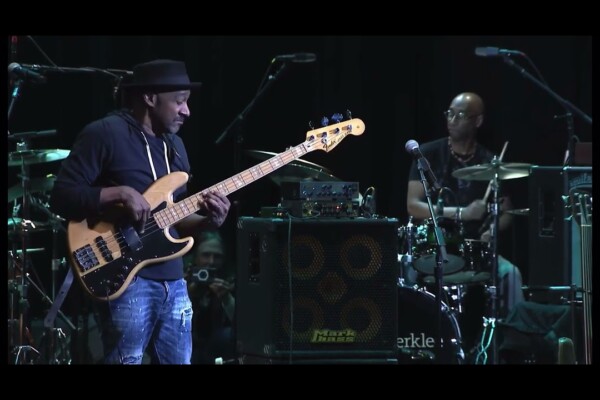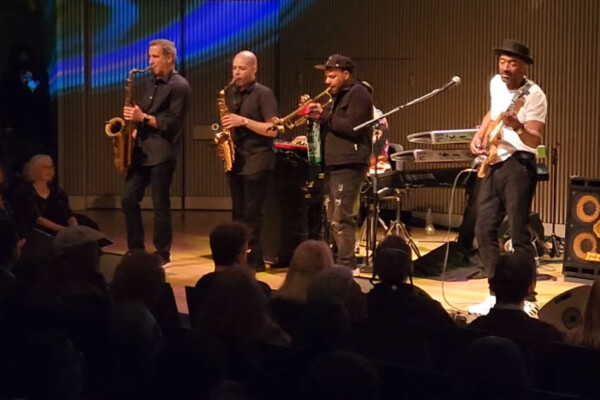Get In The Van: Touring Tips From The Pros
Spring is here and Summer is just around the corner. That means it’s just about time to pack up the van and take your jams on the road. Before you start pounding the pavement, it’s probably a good idea to take a few notes on what to expect and what to be prepared for on the road. Gear malfunctions, lack of sleep, and boredom can eat away at even the most steadfast bassist in tough circumstances.
That’s why we went through our interviews archive to share a few tips from the pros. From keeping busy to getting your stamina up, bass players from every genre weigh in on what they think you should know.
Ra Diaz (Suicidal Tendencies)
 First, I would say be happy and grateful. Understand that you are doing something that other people can only dream of. There’s fans all over the world that this might the only chance they have to see you live, or people that have been waiting years for you to play in their town. So always do your best, smile, be on time and be polite to everyone. That includes the band and crew, venue staff, hotel staff, flight attendants, and so on. Second, stay focused and healthy. Our shows are pretty intense and physically demanding, and you can tell by looking at me that I’m not the most athletic guy, but I do try to stay as healthy as possible on the road. You know, eat light, stuff like that. Another good piece of advice would be to travel light. Just take what you really need. Oh, and Febreze, lots of it [laughs].
First, I would say be happy and grateful. Understand that you are doing something that other people can only dream of. There’s fans all over the world that this might the only chance they have to see you live, or people that have been waiting years for you to play in their town. So always do your best, smile, be on time and be polite to everyone. That includes the band and crew, venue staff, hotel staff, flight attendants, and so on. Second, stay focused and healthy. Our shows are pretty intense and physically demanding, and you can tell by looking at me that I’m not the most athletic guy, but I do try to stay as healthy as possible on the road. You know, eat light, stuff like that. Another good piece of advice would be to travel light. Just take what you really need. Oh, and Febreze, lots of it [laughs].
Sandy Beales (One Direction)
 For prep on a big tour, it’s important to double check all the gear before heading out to eliminate any problems that may come up. It’s also really worth taking things to occupy your downtime, which there can be a lot of. I always travel with an audio interface, which has proven to be invaluable a few times either for practice or for laying down bass on tracks I have been working on.
For prep on a big tour, it’s important to double check all the gear before heading out to eliminate any problems that may come up. It’s also really worth taking things to occupy your downtime, which there can be a lot of. I always travel with an audio interface, which has proven to be invaluable a few times either for practice or for laying down bass on tracks I have been working on.
Jeff Hughell (Six Feet Under)
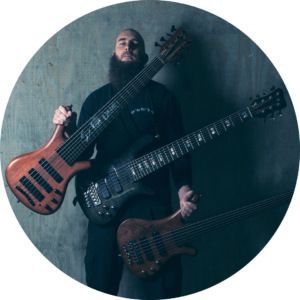 Probably one of the best things to do is just to get out there and see what’s around. If you’re in a town, try not to just sit in the tour bus the whole time. Go to the local places and experience it rather than just sitting around. If you do have a big backstage area, it’s good to sit there and work on your instrument to keep things fresh. You have to keep busy. Don’t just go on the road and drink 24 hours a day [laughs]. That’s not going to help you.
Probably one of the best things to do is just to get out there and see what’s around. If you’re in a town, try not to just sit in the tour bus the whole time. Go to the local places and experience it rather than just sitting around. If you do have a big backstage area, it’s good to sit there and work on your instrument to keep things fresh. You have to keep busy. Don’t just go on the road and drink 24 hours a day [laughs]. That’s not going to help you.
Frankie Poullain (The Darkness)
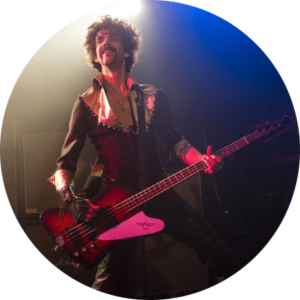 A good [tip] is to get the hotel to send up a heater because then you can open your hotel window. That sounds a bit irresponsible against the environment, but these hotel chains make so much money. Then if you’ve got problems with laundry from moving around all the time, you can rinse off your stuff in the shower and stick it on the heater so it’s dry in the morning. That sounds a bit effeminate, I guess, but it’s important for bands that wear costumes on stage like we do. It’s not always easy to get things cleaned properly, you know?
A good [tip] is to get the hotel to send up a heater because then you can open your hotel window. That sounds a bit irresponsible against the environment, but these hotel chains make so much money. Then if you’ve got problems with laundry from moving around all the time, you can rinse off your stuff in the shower and stick it on the heater so it’s dry in the morning. That sounds a bit effeminate, I guess, but it’s important for bands that wear costumes on stage like we do. It’s not always easy to get things cleaned properly, you know?
Sometimes you’ve got to do gigs guerrilla-style when you’ve got bad backstage facilities. Tonight we’re going straight [to the gig] in a taxi with our stage outfits on ten minutes before. We’ll go straight on then straight to the taxi afterward. Some people don’t really treat you well or look up to you properly. So don’t get angry: just deal with it in a professional way. Rise above when people treat you badly. Don’t take it out on the crowd or put on a shit gig. Just be clever about it.
Alana Rocklin (STS9)
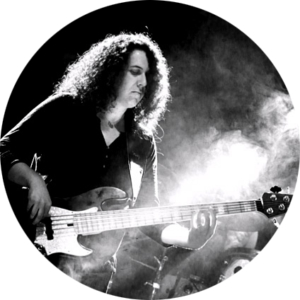 I try to practice every day. My main thing is to make sure that my stamina is up for it. We play very long shows and it’s a lot of bass playing. If I’m not practicing every day leading up to [a tour], I really notice it, so I try to keep it up.
I try to practice every day. My main thing is to make sure that my stamina is up for it. We play very long shows and it’s a lot of bass playing. If I’m not practicing every day leading up to [a tour], I really notice it, so I try to keep it up.
The other thing is that during the tour we might play over 100 unique songs. We try to change our show nightly and we have a really amazing relationship with our fans. There are so many songs and they want to hear stuff from the beginning up to now. I’m constantly learning STS9 songs and making sure I am referencing all different years and versions of each song to study it in this really deep way.
Larry Graham
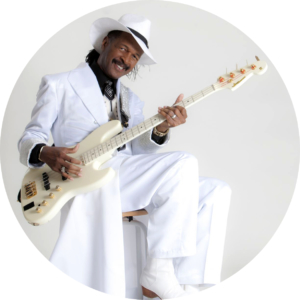 The beauty of touring is especially when you get to go to places you haven’t been and experience the cultures. We played Turkey not that long ago and had a few days off there and got a chance to enjoy Istanbul. Then, of course, we love to play. I love my band. They’re great folks, all out of Oakland, and they all get along real well, so that makes it fun on the road.
The beauty of touring is especially when you get to go to places you haven’t been and experience the cultures. We played Turkey not that long ago and had a few days off there and got a chance to enjoy Istanbul. Then, of course, we love to play. I love my band. They’re great folks, all out of Oakland, and they all get along real well, so that makes it fun on the road.
Nate Brenner (Naytronix, Tune-Yards)
 The biggest one is not to drink a lot of alcohol [laughs]. If you’re constantly partying, every day you’re starting from a loss and it becomes a struggle. I think it’s important to stay healthy and get enough sleep if possible. I think it’s helpful to think of yourself as an athlete. If you’re an NBA player, hopefully, you’re not going to be getting wasted every night. [laughs] You have to approach it like that. Treat your body with a lot of respect and put in the right types of food and beverages.
The biggest one is not to drink a lot of alcohol [laughs]. If you’re constantly partying, every day you’re starting from a loss and it becomes a struggle. I think it’s important to stay healthy and get enough sleep if possible. I think it’s helpful to think of yourself as an athlete. If you’re an NBA player, hopefully, you’re not going to be getting wasted every night. [laughs] You have to approach it like that. Treat your body with a lot of respect and put in the right types of food and beverages.
Marcus Miller
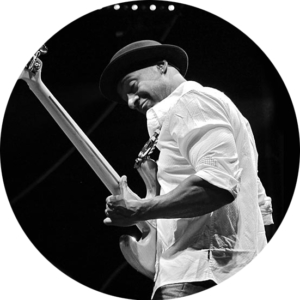 Well, there are a lot of differences [when touring overseas]. It’s not really as much overseas, but different countries. For instance, France. Their government really takes a strong role in making sure people are educated in culture and music and art. You feel that when you’re playing for them. If you refer to a Duke Ellington tune or if you play an old standard then they might have an idea of what that is and have an appreciation for it, whereas the younger U.S. audience, because they haven’t been exposed to that, might not even know what you’re doing. They’ll appreciate it, but they don’t have the depth of appreciation because they haven’t been exposed to that.
Well, there are a lot of differences [when touring overseas]. It’s not really as much overseas, but different countries. For instance, France. Their government really takes a strong role in making sure people are educated in culture and music and art. You feel that when you’re playing for them. If you refer to a Duke Ellington tune or if you play an old standard then they might have an idea of what that is and have an appreciation for it, whereas the younger U.S. audience, because they haven’t been exposed to that, might not even know what you’re doing. They’ll appreciate it, but they don’t have the depth of appreciation because they haven’t been exposed to that.
When we first started traveling overseas, we went to Japan first. The Japanese audience treated the music like classical music, so they wouldn’t make a sound during the show until the last note, then they’d applaud. When you come from New York, that’s a really weird feeling. My music has a strong community aspect to it. It’s based rhythmically in funk and Caribbean rhythms that are supposed to involve people. That’s what those rhythms are created for, so to see people just looking at you is kind of weird. But the world is much smaller now and Japanese people are yelling at you the same way they’re yelling at you in D.C. now. It’s really interesting to see things change. Amsterdam and Holland, man… Sometimes we can’t even hear what we’re playing because the energy in the audience is so crazy. Every city now has its own personality.
Plus, we don’t have any words in our music, so we’re able to go a lot of places and not worry about the language barrier. For instance, we were in Luanda, Africa last week, and we could really relate to the audience because we’re just playing notes, man, and those notes have all the emotions that every human shares. It’s really nice to be able to communicate all around the world.
Miles Mosley
 When touring I realized that making my own cables, or at least knowing how was a really good thing. It meant that I’d never be in a bind when in the trenches. If a cable fails I just break out the soldering kit and make another one. I don’t necessarily notice any big help when it comes to tone or anything I just like the control of not having to find an open music shop at midnight, because of a silly cable. It’s also much cheaper and more reliable.
When touring I realized that making my own cables, or at least knowing how was a really good thing. It meant that I’d never be in a bind when in the trenches. If a cable fails I just break out the soldering kit and make another one. I don’t necessarily notice any big help when it comes to tone or anything I just like the control of not having to find an open music shop at midnight, because of a silly cable. It’s also much cheaper and more reliable.


